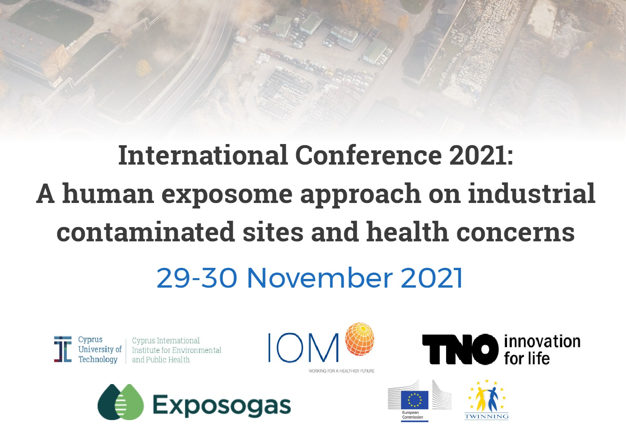Exposome Conference 2021
- Home
- Exposome Conference 2021

A human exposome approach on industrial contaminated sites and health concerns
This International virtual conference aims to showcase the scientific and technological advances in the assessment of environmental and public health metrics and outcomes of general population residing nearby industrially contaminated sites (ICS). The ICS are defined as areas hosting or having hosted industrial human activities which have produced or might produce, directly or indirectly (waste disposals), chemical contamination of soil, surface or ground-water, air, food-chain, resulting or being able to result in human health impacts (ICSHNet, 2019).
There are no registration fees for the conference.
The aims of the Exposome Conference 2021 are to:
- exchange knowledge and experiences on the application of the exposome concept for the improved understanding of environmental and public health risks associated with ICS activities
- create awareness among scientists and ICS stakeholders about the pressing environmental and public health risks for the general public surrounding ICS
- overcome barriers linked with the deployment of prevention and control measures for ICS in the community
Theme: The focus of the conference would be on the applications, utility and tools of the human exposome framework on environmental and occupational health practical applications in the Mediterranean region and more globally.
-
We are delighted to also offer a free virtual 2-day training school. This will be held on 25-26 November 2021. Click for more information and to register.
About the conference
This international virtual conference will address the complex environmental health issues related to ICS using the human exposome approach, showcasing the scientific and technological advances in the assessment of environmental exposure and public health risks of the general population residing nearby ICS. Particular attention will be placed on emerging tools and technologies that could help better assess environmental and public health risks using the human exposome methodological framework and its exposomic tools.
This 2 half-day conference will bring together scientists, researchers, industry and policy makers to engage into discussions towards the further development of exposomic tools and applications that allow for the sustainable development and risk management of ICS. The format would be a mix of oral presentations, panel discussions, and specific ICS case studies from the Mediterranean region, and elsewhere.
#ExposomeConference2021 #ICS #Exposome #PublicHealth
Important dates
For further information about the conference, please contact:
Ms Corina Konstantinou
corina.konstantinou@cut.ac.cy
Background information
Industrially contaminated sites
Contaminated sites and waste are one of the eight priority areas identified by the Declaration of the Sixth Ministerial Conference on environment and health of the WHO European Region (Ostrava, 2017). Contaminated sites usually represent a long- term legacy of past and current development, a probable lasting cause of preventable non-communicable disease, and a living reminder of the inherent lack of sustainability of the linear economy.
Industrial emissions are one of the most relevant sources of environmental contamination, and the characterization of the health impact of industrially contaminated sites (ICS) is a challenging task. This is due to several characteristics of ICS: heterogeneous hazards and chemical mixtures affecting several environmental media (soil, air, water, and food chain); multiple agents from multiple sources; close contiguity of industrial settings to urban areas, often densely populated, and therefore with expected high impacts; multiple etiology of most potentially related diseases; issues of environmental justice and inequalities; difficulty in quantifying population exposure.
The ICS are defined as areas hosting or having hosted industrial human activities which have produced or might produce, directly or indirectly (waste disposals), chemical contamination of soil, surface or ground-water, air, food-chain, resulting or being able to result in human health impacts (ICSHNet, 2019). The methodology and practices in studying ICS and health outcomes are very heterogeneous, and this is not surprising given their complexity: the approach may be multi-faceted at the level of problem framing, study design, methodology, analysis, interpretation of results, risk communication, and derivation of implications for policy and remediation. These dimensions are often separately addressed in real contexts, and this is one of the reasons why a comprehensive approach to the problem is still needed.
Human exposome
The human exposome concept originally coined by Dr. Wild allows for the comprehensive characterization of all exposures during one’s lifetime, including the endogenous response. The methodological framework of the human exposome and its exposomic tools are warranted to help us better address the unique, yet complex, characteristics of ICS.

